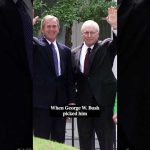Former Vice President Dick Cheney died on November 3, 2025, at the age of 84, the family said, following complications from pneumonia and longstanding cardiac and vascular disease. His passing closes the chapter on one of the most consequential and controversial public servants of the post‑Cold War era, a man whose fingerprints are all over the security state that emerged after 9/11.
Cheney was not a back‑bencher; he was the engine behind the Bush administration’s “war on terror” posture and a driving force pushing the nation into the Iraq war—a decision that reshaped the Middle East and cost American lives and treasure. Conservatives who value strength must be honest with themselves: national security cannot be a blank check for permanent war and hubristic intelligence claims.
He also made restoring and expanding executive power an article of faith, arguing that a weakened presidency would fail to protect the country and therefore needed fewer checks, not more; the post‑9/11 era saw warrantless surveillance, expanded detention powers, and a greater tilt toward secretive decision‑making. That accumulation of authority came at a price — the erosion of civil liberties and a dangerous precedent that future leaders of any stripe could exploit.
What too many in the country forget is that Cheney’s homeland security agenda didn’t stop at the battlefield; after the anthrax attacks the administration pushed massive investments in biodefense, Project BioShield, and new research programs meant to blunt biological threats. Critics have long warned that the same programs intended to protect Americans also expanded an industrial‑government complex that pushed the bounds of risky research—an issue that birthed fierce debates in later years about so‑called gain‑of‑function work and oversight.
None of this is to deny service or patriotism; Cheney served in multiple roles and believed he was keeping America safe. But patriotism without prudence becomes dangerous. His life is a sober lesson: concentrate power and cultivate secrecy, and even the best intentions can produce catastrophe—whether through unnecessary wars, perpetual surveillance, or an unaccountable bio‑security apparatus.
Hardworking Americans deserve leaders who balance strength with restraint, not ideologues who treat power as the prize. The conservative movement must reclaim that balance: defend our nation, protect our liberties, and insist on transparency and accountability in how we wage war, how we surveil, and how we fund risky science. The last thing any patriot wants is a repeat of the mistakes that hollowed out trust in our institutions.
We can honor the service of a man who fought for America while also learning from the wreckage of his mistakes. Let Cheney’s life be a warning and a call to build a conservative renewal that is both robust in defense and relentless in protecting the constitutional freedoms that make America worth defending.




